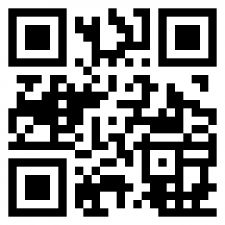I just read the below article on Inman news and would like to see what you guys think. The technology is not new as the writer mentions in the the article, but seems to be new in the real estate world. You need a smartphone to read the ‘QR code’. The biggest problem i foresee with this technology is explaining it to a buyer everywhere you use it. It could be overseen as just an internal reference bar code by the client. We are working on continuing our development on mobile technology and completing our Help-U-Sell Reality Search application as demonstrated at our Tech Summit this year. This QR code technology could be a nice add on. Let me know what you guys think…
Article from Inman News:
Real estate’s QR code ‘fever’
Despite rising popularity, it’s not mainstream yet
BY TERESA BOARDMAN, MONDAY, NOVEMBER 29, 2010.
Realtors love QR codes. It is like a fever that is sweeping the country. The QR code — basically a next-generation bar code — was invented in Japan in 1994.
A QR code (QR is short for “quick response”) can be read by camera-equipped smart phones via an app. The codes are handy because it is faster and easier to scan a code into a phone than it is to type a Web address. QR codes have also been called “mobile tagging”.
At the recent NAR convention in New Orleans, QR codes were all the rage. NAR used them on printed materials, and so did some of the vendors. I met Realtors who have them on business cards.
The technology seems to be more widely adapted than it was a few years ago but it isn’t exactly mainstream and I don’t think it will save the housing market.
I had a listing that was a short sale, but even with a QR code on the flyers it went into foreclosure before it sold.
In 2007 I had a QR code on the sidebar of my blog and no one knew what it was. It didn’t get any clicks so eventually I deleted it because I needed the space.
A year ago I wrote a short article about QR codes on my Posterous blog and I asked people if they knew what the funny black square was in the post. None of my readers did.
A couple of weeks ago I put a QR code in a blog post on my real estate blog. People who scanned the code were taken to a Web page that congratulated them for using the QR code and invited them to leave a comment.
The only people who left comments were Realtors who expressed their excitement about the codes and wrote about using them for property marketing because they have QR code fever.
It is easy to generate a QR code and it is free. Give it a try. All you have to do is type in some information, such as a URL, and click to instantly generate the code.
The QR code can be printed on most anything. Hint: Realtors like to print them on any type of marketing like fliers, business cards, and for-sales signs so that they can all be scanned by mobile phones.
QR codes can also contain text messages or phone numbers.
I didn’t set out to explain what a QR code is, but I know from experience that every time I mention QR codes I have to explain what they are.
QR code scanning has not been adapted by the masses in my community. In fact, according to my Google Analytics my websites are most often accessed by PC’s using Internet Explorer and occasionally someone views them with a mobile browser.
My websites were optimized for the mobile browsing revolution three years ago, and each year more people view them with mobile devices.
For generating QR codes, I like to use a service like http://bit.ly/ because I get a short URL so the code has less data in it and is easier to scan and print and I can track the clicks through my bit.ly account.
I use analytics for just about everything because I want to know if my marketing efforts are effective, and reading an article about how effective something is just isn’t enough for me. Hyperbole is often used instead of data, but it isn’t nearly as useful for making business decisions.
Disclaimer: Agents who plan to use QR codes to wow potential sellers should be prepared to spend as much time during the listing presentation explaining what the QR code is and why it is such a great thing as they do explaining why they, themselves, are great.
Real estate search and marketing site Trulia.com, for one, is offering free QR codes for real estate listings.
Judging from the comments on that announcement, agents are excited about having QR codes for listings. When a code is scanned, it will display a listing from the Trulia website.
Personally, I would rather generate my own code for free so that when people scan it they come to my website. Trulia was wise to offer the QR codes while the fever is still sweeping the country.
Vendors and various third-party sites will take advantage of Realtors’ newfound love for QR codes. That is why I decided to explain how to generate one for free.
They are gaining in popularity and it is a good idea to use them where it is appropriate, but at least for now I don’t think the codes are going to give Realtors that killer competitive advantage.
Not all homebuyers have smart phones, and I have worked with several homebuyers who use Android-based devices or iPhones but have no interest in using QR codes as a tool in their home search.
Some still prefer viewing the Internet on a nice big screen at home instead of on a little phone screen while parked in front of a for-sale home.


